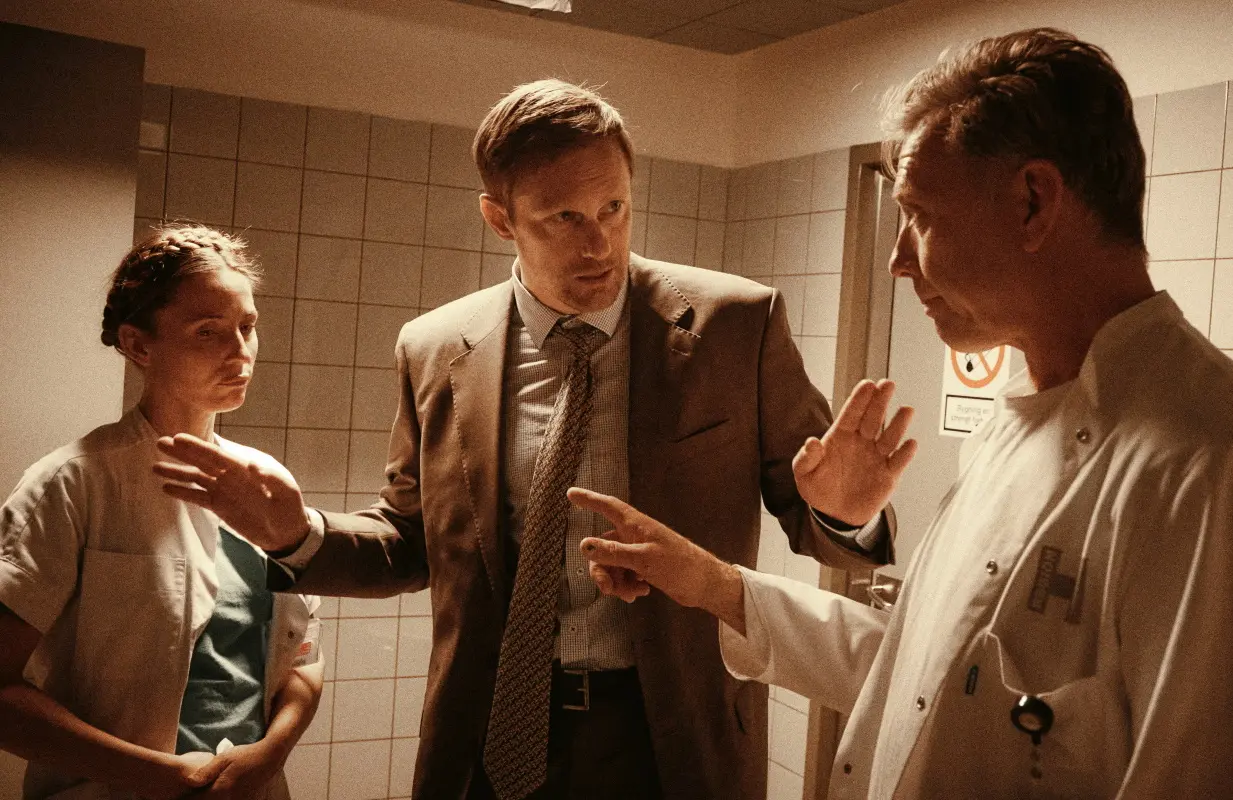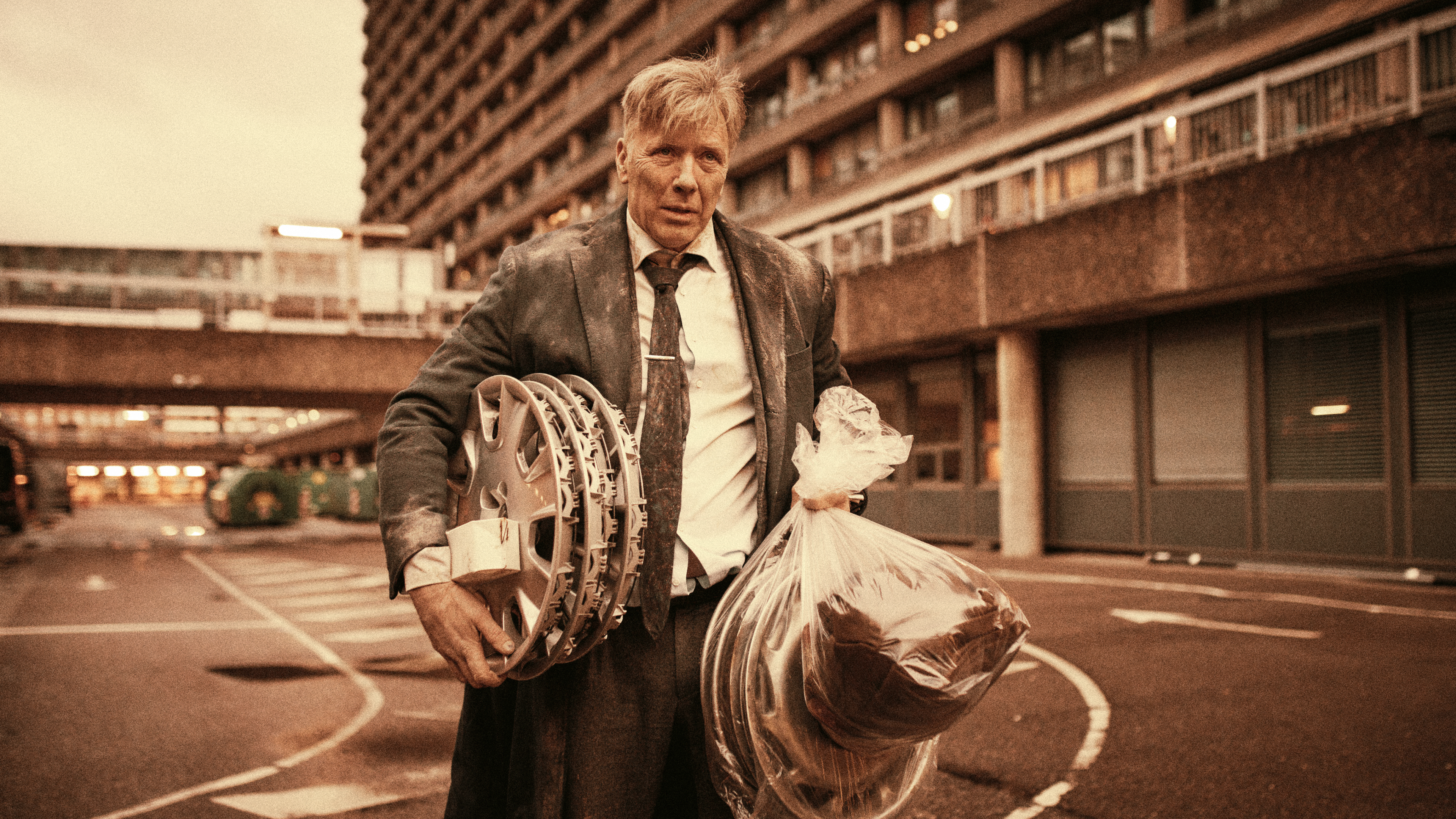With The Kingdom: Exodus, Lars von Trier Faces His Mortality as Only He Can
-
 The Kingdom Exodus (Photo: Christian Geisnaes)
The Kingdom Exodus (Photo: Christian Geisnaes)It’s Christmastime again in Denmark and Lars von Trier is in pain. In The Kingdom: Exodus, a revisiting of his dormant cult anthology series The Kingdom, Trier takes on the subjects that have long afflicted him: the existence of God and evil, societal hypocrisies, and his own status as master provocateur.
There’s also a matter of unfinished business. Told over two seasons broadcast in 1994 and 1997, The Kingdom followed the supernatural and bureaucratic goings on within Denmark’s national hospital. When the new season premiered at this year’s Venice Film Festival, Trier said he was compelled to finally revisit the series out of an obligation to closure. However, the series’s return reflects the journey his career has taken. No longer simply a morbid satire that occasionally breaks the fourth wall, The Kingdom has morphed into a revisiting of a past that may or may not be real, whose consequences are only bound to repeat themselves.
Death has loomed large over the series, with a third season long-stalled after the death of its two lead players Kirsten Rolffes and Ernst-Hugo Järegård in the immediate years following the second season. Exodus circumvents their absence by providing their departed characters with highly similar stand-ins; Rolffes’ kindly mystery solver Mrs. Drusse has a surrogate in insomniac Karen (Bodil Jørgensen), Järegård’s reprehensible buffoon Dr. Stig Helmer has been substituted with his all-too-similar son, Stig Jr. (Mikael Persbrandt). This time, the coming of Christmas also brings the reemergence of the hospital’s ghosts, with a plot to unleash the evil Grand Duc’s apocalypse. Much of the dark humor and nihilistic pathos of Exodus is Trier saying that so much has changed during his career, and yet everything has stayed the same.
Trier is mentioned by name in the action of Exodus, with characters referencing the existence of The Kingdom and how Trier’s depiction of the hospital has harmed its reputation over the years. It’s a narrative choice that is more devilish than winking in its blurring between reality and the surreal, and the first sign that Trier is taking the series in a more self-aware and self-reflective direction than the biting satire of the original two seasons. Much like his aesthetic approach, the near 30 years since the series’s beginning has seen a tidal change in Trier’s stature as a controversial storyteller.
Though he achieved success with his early films like The Element of Crime and Europa, Trier wouldn’t become an international cause célèbre until after the first season of The Kingdom aired. Breaking the Waves caught attention for its frank depiction of sexuality and the manipulative power of religion, and both Dancer in the Dark and Dogville were accused of anti-American sentiments. In the past decade, his films like Antichrist, Nymphomaniac, and The House That Jack Built were accused of sexism and depravity in their extreme depictions of sex and violence, all while asking more esoteric, well-read questions about the nature of art.
And then there were his even more publicly decried actions outside of the content of his work. During the Cannes Film Festival launch of his film Melancholia, he infamously made joking comments musing on personal sympathy toward Hitler and was declared persona non grata by the festival. There were claims of psychological abuse and sexual harrassment by Björk during the making of Dancer in the Dark. He apologized for the former, denied the categorization of the latter.
Through it all, Trier would poke and prod at how he was perceived, making films that could troll his most critical audiences while also plumbing the depths of his own existential crises. Exodus does both, with even graver revelations that have altered the DNA of his Kingdom. This past summer, Trier revealed that he was diagnosed with Parkinson’s disease. Whereas Trier previously would close each episode by donning a tux and directly addressing the audience to obliquely unpack the episode’s themes, Trier ends each Exodus installment pointedly hiding behind the curtain. He tells the audience he shirks this tradition “out of vanity,” knowingly leaving us to wonder about his condition.
But that diagnosis isn’t entirely what appears to be troubling him here, and Trier is equal parts fatalistic and mocking at contemporary concerns. Early on, Helmer Jr. (Mikael Persbrandt) questions the hospital’s lack of diversity among its doctors. Trier shows regressive rot at both levels of the bureaucracy: the staff asks two Black janitors to pretend to be doctors, but Helmer Jr. enables their actions through lack of follow-through. As he did with the original seasons with the elder Helmer’s representation of Swedish-Dane intercultural conflict, Trier uses Stig Helmer Jr. as a stand-in for the evils and delusions of nationalism, including participating in a secret Swede support group and masturbating to the Swedish national anthem. Among other satirical provocations, Exodus shows Trier hasn’t waned in pushing buttons even as he condemns.
Beyond the series’s obsession with religion and the afterlife, Exodus is fixated on its own lore and the fourth walls that it breaks between seasons. Karen, having watched the original seasons before admitting herself to the hospital, has a hyper-awareness of the rules of the Trier’s game. The hospital’s foundation (both the literal haunted bleaching lake it stands upon and the philosophical “consistent denial of the spiritual”) is what propels the season towards its conclusion. Trier makes himself a part of that lore, and in doing so, a part of its decay and its demise.
By giving The Kingdom a definitive ending, Exodus is itself a kind of death. The season becomes a self-reflection on Trier’s mortality, all without directly mentioning his illness. There is no acknowledgement of the possibility that this is the last thing he makes, but by invoking his own name and hiding himself, Trier welcomes our questioning. Of his recent output, Exodus is perhaps most aligned to The House That Jack Built, both in its sheer audacity to transgress and in showing Trier as an artist who wishes to address and evade in the same measure.

With Exodus, Trier again confronts and avoids his reputation, not ambivalent exactly, but playfully evasive. At points, he refers to himself as “repentant,” characteristically bound to provoke “for the lack of any other excuse than being Lars von Trier.” In the end, he casts himself as Satan.
But as he explores the past of The Kingdom, it is impossible to not also see the narrative signs of an artist examining himselfthemselves and his impulses, making sure to get the jab in while he still can. There may be some intention in making The Kingdom quasi-bookends to his career, signifying the revolutionary artist he began as that formed the stripped-down Dogme 95 movement and the florid, philosophical one that he ultimately became. However, Trier would never be prone to such sentimentality. Instead, Exodus reflects the artist as he always was: bracingly candid and evasive in the same breath, a provocateur with a complex relationship with religion and spirituality, and a compulsory trickster.
The Kingdom: Exodus premieres November 27 on Mubi, with new episodes streaming weekly through December 25.
Chris Feil is a freelancer writer and co-host of the This Had Oscar Buzz podcast. His previous work can be found at Vulture, Vice, Paste, and The Film Experience. Follow him @chrisvfeil on Twitter.
TOPICS: The Kingdom Exodus, Mubi, Alexander Skarsgard, Bodil Jørgenson, Lars von Trier, Mikael Persbrandt